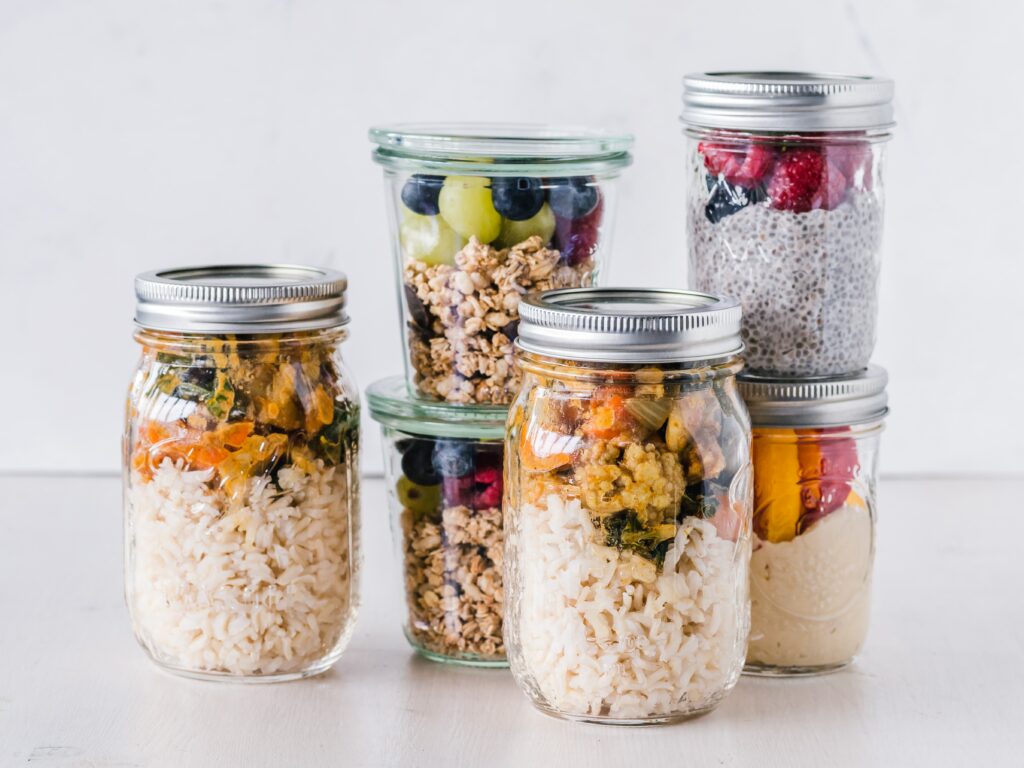Let’s rewind. It’s 2017. I walk into my OB’s office, anxiously awaiting my results. Edie, based on your ultrasound images, physical symptoms, A1C, and testosterone levels, you have PCOS. I was stunned. PCO—what? After living most of my adult life with an irregular cycle, I finally had an explanation. During our appointment, she explain potential next steps: birth control, a drug to take for my blood sugar, and eventually, fertility medication. I walked away feeling slightly relieved, but mostly, very confused and equally discouraged. Armed as an Integrative Nutrition Health Coach, I knew there was another way. And thus, I began my healing journey. To this day, I’m living proof you can minimize your PCOS symptoms—naturally. In honor of PCOS Awareness Month, let’s dive into what it is, treatment options, and a PCOS meal plan.

5 million women have pcos
If you’re newly diagnosed (or suspect you have PCOS), you’re not alone. In fact, it’s estimated that 5 million U.S. women have PCOS. Despite the fact it’s one of the most common hormonal disorders among women of reproductive age, it can take years to get diagnosed. And once you’re finally diagnosed, chances are, you’re given a prescription for birth control, metformin, and told to lose weight. For the sake of all women, we can—and must—do better. We need more awareness about PCOS for health care practitioners (and the public, in general). We also need more research, funding, and access to reliable health care. That said, September is officially National PCOS Awareness Month—a step in the right direction.
what is pcos?
Although the specific cause is not fully understood, PCOS is multifaceted. This syndrome has various genetic, endocrine, and environmental catalysts. It’s part hormonal and part metabolic. Like other reproductive disorders, PCOS affects menstrual health, fertility, and more. Women with PCOS typically present with higher levels of male hormones, called androgens. In turn, PCOS causes a slew of unwanted conditions: irregular (or a complete absence of) periods, infertility, persistent acne, and abnormal hair growth patterns in women.

What are COMMON PCOS SYMPTOMS?
This varies. It’s important to know that name polycystic ovary syndrome is a bit misleading. It describes the numerous small cysts (fluid-filled sacs) that form in the ovaries. However, some women with PCOS don’t have cysts. Below are general PCOS symptoms:
- Irregular periods or rarely having a period
- Abnormal hair growth, such as lip hair, stomach hair, neck or facial hair (conversely, some women experience male balding patterns)
- Acne
- Infertility, due to anovulation
- Tendency to being overweight, particularly with weight in the abdomen
- Insulin resistance with signs of diabetes
- Blood sugar regulation issues
- High testosterone
- Via ultrasound, one or both ovaries are enlarged with many immature eggs
HOW can you TEST FOR PCOS?
Unfortunately, there is no single test for PCOS, and it’s difficult to diagnose. Typically, a physical exam, ultrasound, and blood tests can help diagnose PCOS. You need to meet two of these three official criteria to be diagnosed:
- Irregular, heavy, or missed periods due to missed ovulation.
- Higher levels of androgens are present in the blood (hyperandrogenism), shown by a blood test OR symptoms (excess facial or body hair growth, scalp hair loss, or acne).
- An ultrasound shows polycystic ovaries.

3 DIFFERENT TYPES OF PCOS
Before unveiling how to heal PCOS naturally, it’s important to understand the three types of PCOS. In mainstream medicine, each type of PCOS is typically (and unfortunately) managed with the same. But here’s the gist: each type has different symptoms. For example, not all women with PCOS are overweight, nor do they have excess hair growth. It’s possible to have a combination of these three types of PCOS, or for the root cause of your PCOS to evolve over time.
INSULIN-RESISTANT PCOS
This is the most common PCOS type. It’s the type that I was diagnosed with, personally. High insulin levels interfere with ovulation, causing irregular cycles and a slew of other symptoms. Women with this kind of PCOS usually have blood sugar and insulin levels that suggest diabetes or pre-diabetes. Getting my blood sugar under control was an absolute game-changer.
INFLAMMATION-BASED PCOS
This type of PCOS is most often present in women who are not overweight—nor do they present classic symptoms of PCOS. A variety of factors causes inflammation, including food intolerances, exposure to environmental toxins, and a poor diet.
SYNTHETIC HORMONE-INDUCED PCOS
This kind of PCOS is common for women who have been on the pill or other hormonal birth control (for a long time). This was also me. Birth control’s synthetic hormones shut down communication in the body in order to prevent pregnancy. However, it can take time to re-ignite this communication channel.
How I live with PCOS
Under the care of a functional medicine doctor, I tried a few different things. First, I changed my diet. Mainly, I focused on balancing my blood sugar. I also incorporated more healthy fats and gut-friendly foods. When consuming gluten and dairy, I made sure to choose high-quality. These habits still ring true today. I began seed cycling and taking supplements as well. Furthermore, I opted for more gentle exercise, started routine acupuncture, and incorporated a daily mindfulness practice.
Everything—from food, supplements, and lifestyle choices—proved beneficial. It’s hard to know exactly what did the trick. But after three months, I regained my cycle. Ovulation was still hit or miss, but from 2018 to 2019, I focused on tuning in to my body’s intuitive needs, and it changed me for the better. I learned that healing from a hormone imbalance is not linear. Trial, error, and a lot of patience were my guiding lights. We still needed to use Clomid to get pregnant, but ever since I weaned my son, my PCOS symptoms have remained minimal.

do you need to go on a diet to heal your pcos?
The long, short: no. Rather than approach food from a diet mentality, consider healing your PCOS with a focus on balanced blood sugar. Ultimately, the right nutrition can be tremendously beneficial for balancing hormones. After all, what you eat is either helping or hurting your hormones. Your diet plays a significant role in hormonal production (and maintaining healthy hormonal balance!). Eating nourishing foods—and the right balance of these foods—can ensure happy hormones. Au contraire, consuming too many inflammatory oils, processed foods, and sugar can cause imbalances. In turn, wreaking havoc on your body. This following PCOS meal plan will empower you to take the health of your hormones into your hands. Food is fuel, pleasure, joy, and culture, but it’s also medicinal. Use it to your advantage to bring your body into balance.
Is it necessary to eat dairy-free if you have pcos?
If you’ve spent time researching what fellow PCOS-ers eat, you’re probably aware that some advocate for eating gluten-free and dairy-free. These are common recommendations for the management of PCOS. Keep in mind that just because they’re common doesn’t mean they’re universal truths. When it comes to dairy, there is no proven link between restricting dairy and improving PCOS symptoms.The recommendation to go dairy-free—for the management of PCOS—is rooted in a correlation to acne, as acne and PCOS are often observed together. But remember, correlation isn’t the same as causation. Love your organic cheese? Good news: a dairy-free approach for PCOS management may not be necessary for you.
what about gluten?
Same goes for gluten. Research shows a gluten-free diet will not automatically improve your PCOS symptoms—unless you have an underlying sensitivity. Rather, research shows that improving PCOS symptoms comes from choosing more organic, wholesome—and less highly processed—foods. All of that said, if you have an autoimmune condition, such as Hashimoto’s thyroiditis (which is common, but not universal in women with PCOS), gluten can trigger inflammation, and lead to gut issues. Keep in mind that eliminating gluten can decrease symptoms, but it is not only gluten that causes autoimmune disorders.

Work with a PCOS-focused Registered Dietitian to help you learn how nutrition can support management of your PCOS.
pcos meal plan
Without further ado, below is a three-day PCOS meal plan. With the following snacks / dessert, feel free to incorporate them to meet your hunger. Some days, you’ll need a couple of snacks + dessert. Other days, you won’t be as hungry. Understanding how to connect with your natural appetite is key. Keep in mind that these are general recommendations and you may need to adjust this meal plan to meet your daily caloric needs.
A few things to meal prep: banana bread, chocolate chia pudding, and a couple of hard boiled eggs.
DAY 1
Breakfast: chocolate chia pudding with berries and a spoonful of nut butter (or tahini).
Lunch: salad or sandwich!
Dinner: 15-minute cauliflower fried rice.
Snacks / Dessert: cottage cheese on a cracker; olives, carrots, and cucumber with hummus; protein bar.
DAY 2
Breakfast: chocolate chia pudding with berries and a spoonful of nut butter (or tahini).
Lunch: herby salmon salad with seedy crackers.
Dinner: halloumi sheet pan (optional: rotisserie chicken or baked tofu on the side).
Snacks / Dessert: slice of banana bread with ghee; crackers with string cheese; handful of walnuts and a hard boiled egg.
DAY 3
Breakfast: breakfast sandwich with chicken sausage, berries, and walnuts on the side.
Lunch: avocado caprese salad and sprouted grain bread with hummus and hemp hearts.
Dinner: leftover avocado caprese salad and a grass-fed burger with grilled peppers, onions, butter lettuce, and low-sugar ketchup.
Snacks / Dessert: slice of banana bread with ghee; homemade trail mix (raw nuts, pumpkin seeds, no sugar-added chocolate chips, and dried apricots); protein bar.
Images courtesy of Unsplash.
This article contains affiliate links. Thank you for supporting Wellness with Edie!
This article is for informational purposes only. It is not, nor is it intended to be, a substitute for professional medical advice, diagnosis, or treatment and we recommend that you always consult with your healthcare provider.



Leave a Reply